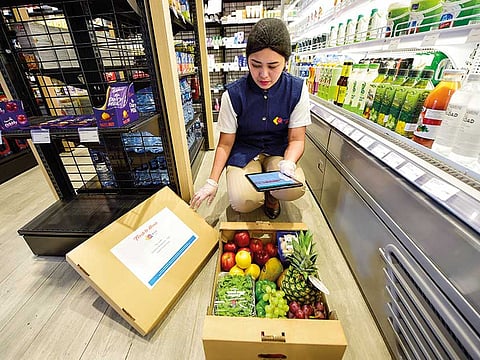Ramadan: Up to 65% off on over 10,000 grocery items in UAE
Price reductions may amount to Dh35 million in savings for shoppers: Ministry of Economy

Abu Dhabi: Over 10,000 essential grocery items will be offered at discounts of up to 65 per cent at supermarkets during Ramadan, potentially saving UAE shoppers an estimated Dh35 million, according to the UAE Ministry of Economy.
In a press briefing on Tuesday, the ministry said that to ease the financial burdens on UAE shoppers, the ministry has collaborated with major retailers to launch extensive Ramadan discounts on thousands of products.
Additionally, authorities have ensured that daily fresh produce imports remain stable, with at least 15,000 tons of fruits and vegetables arriving at Dubai’s central market in Al Aweer and 6,000 tons imported daily by Abu Dhabi traders. “These measures are designed to prevent supply shortages and maintain competitive pricing across the country,” the ministry said.
The ministry has stepped up efforts to regulate consumer protection and market stability ahead of Ramadan, outlining a series of initiatives to ensure fair pricing, prevent market exploitation, and maintain a steady supply of essential goods.
Sultan Ahmed Darwish, Director of the Commercial Control Department at the Ministry of Economy, said, “The UAE has developed a robust system to ensure market fairness and price stability, in line with global best practices.” He added, “By working closely with federal and local authorities and private sector stakeholders, we continue to develop regulations that protect consumers and ensure transparency in the marketplace.”
The government has undertaken several measures to reinforce consumer protection, including the Federal Decree-Law No. 5 of 2023, which introduced significant amendments to the Consumer Protection Law and its executive regulations.
The new framework strengthens oversight mechanisms and introduces over 43 obligations for suppliers, ensuring a more balanced relationship between businesses and consumers while preventing price manipulation.
No price rise for these products
One of the ministry’s key priorities is ensuring price stability on essential goods, particularly during Ramadan, when consumer demand typically surges.
Under the new pricing policy, nine staple items—cooking oil, eggs, dairy products, rice, sugar, poultry, legumes, bread, and wheat—cannot be subject to price increases without government approval. While other products remain subject to market competition, the ministry has vowed to monitor pricing closely to prevent unjustified spikes.
The ministry has also held over 60 meetings with major retailers and suppliers since early 2024, urging them to adhere to updated pricing regulations and maintain supply chain stability. “Our priority is ensuring that retailers and suppliers act responsibly, keeping essential goods affordable and accessible,” Darwish said.
Platform for price monitoring
The ministry has launched the National Digital Platform for Price Monitoring as part of its regulatory strategy. This real-time tracking system enables authorities to monitor price fluctuations on essential goods across major supermarket chains and cooperative societies. This system allows regulators to compare actual prices at various retail outlets, ensuring they remain within approved limits and preventing retailers from exploiting market demand.
Additionally, the ministry has ramped up market inspections nationwide. In 2024 alone, officials conducted 80,249 inspections, resulting in 8,388 recorded violations for price irregularities and non-compliance.
Since January 2025, another 768 inspections have been carried out, with plans for an additional 420 inspections throughout Ramadan. “The goal is to eliminate price exploitation and ensure businesses comply with fair pricing policies,” Darwish stated.
The ministry has also streamlined its consumer complaint system to address grievances related to pricing violations and misleading promotions.
Since the beginning of 2024, 1,891 consumer complaints have been filed through the ministry’s online system, with 93 per cent resolved within the designated timeframe.
Darwish urged consumers to actively report any pricing irregularities, deceptive promotions, or unfair trade practices through the ministry’s hotline 8001222 and local economic authorities.
“Consumer awareness is key to maintaining a fair marketplace,” he said. “We encourage people to report violations so that appropriate action can be taken against businesses that do not comply with regulations.”
Sign up for the Daily Briefing
Get the latest news and updates straight to your inbox


